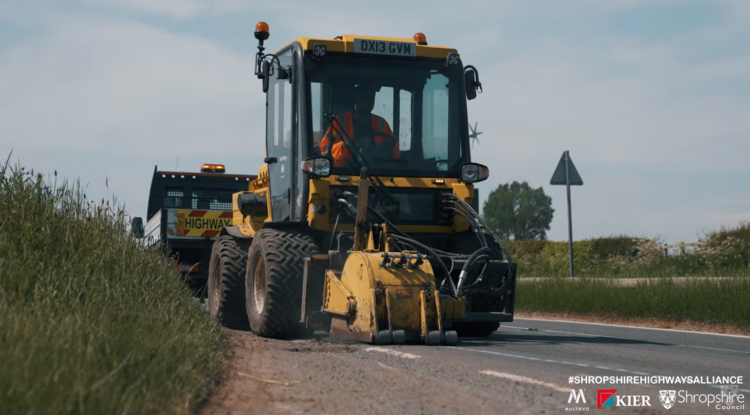Almost 7.000 potholes tackled in three months in bid to improve Shropshire’s roads

The Multihog in action in Shropshire
More than 6,800 potholes and other defects have been repaired in the Shropshire Council area since the start of May 2021, latest figures show.
As part of efforts to improve the county’s roads, crews from Shropshire Council and its contractor Kier are out across the county every day tackling potholes in a variety of ways.
Methods used include jet-patching using the county’s four Roadmaster vehicles, Texpatching [see notes] in town centres and residential areas; and patching using the new Mulithog road planner.
More traditional repairs by gangs are also carried out.
Steve Charmley, Shropshire Council’s Cabinet member for highways, said:
“As I’ve said before, many of our roads are in poor condition and in need of improvement. I use the county’s roads and I’ve seen for myself the large number of potholes and other defects. Indeed, I was recently in north east Shropshire – and this week will visit sites in south Shropshire – to see the issues first-hand, and to see the work that is being carried out to improve our roads.
“I know there are a lot of potholes and other defects in need of attention, right across the county, but we’re working hard to tackle them and to make the county’s roads safer for all road users, as these figures show.
“We’re increasing the numbers of crews tackling the problem, and using new technology and new ways of working. And every day we have teams out across the county carrying out repairs to our roads – repairs that will last.
“There are still many more potholes to treat, but repairing nearly 7,000 in less than three months is a notable achievement, and evidence of the work that we are carrying out to improve the county’s roads.”
For more information visit www.shropshire.gov.uk/highways
Further information
About Texpatch
Under this process, potholes are cleaned out, filled with a unique material called Texpatch, then covered with a neat, square patch. This will provide a longer-lasting, smoother, neater finish compared to traditional pothole repairs, and seals up all joints, which should result in an increased life span for the repair.
Using this process for treating urban potholes will also free up crews to tackle potholes in rural areas.

